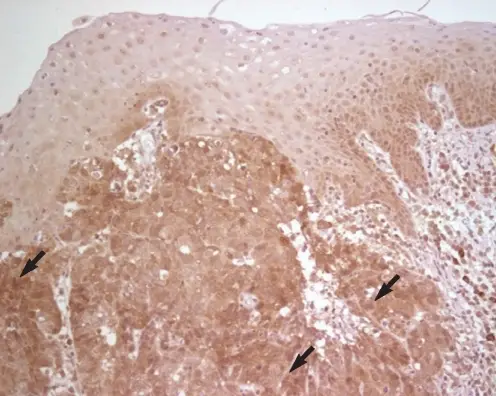Squamous cell carcinoma of the larynx is a malignant tumor that accounts for 95% of laryngeal malignancies.
What is the Pathology of Squamous Cell Carcinoma?
The pathology of squamous cell carcinoma is:
-Etiology: The cause of squamous cell carcinoma is, HPV, alcohol use, cigarette smoking, and infection with Epstein–Barr virus.
-Genes involved: None.
-Pathogenesis: The sequence of events that lead to squamous cell carcinoma; transpires at the histologic and molecular levels. Molecular phases tangled in tumorigenesis not fully elucidated. Histologic advancement arises from typical laryngeal mucosa to dysplastic mucosa, carcinoma in situ culminating to invasive carcinoma.
-Histology: The histology associated with squamous cell carcinoma shows, hyperchromatic cells, squamous cell carcinoma of high grade.
How does Squamous Cell Carcinoma Present?
Patients with squamous cell carcinoma typically affect more males than females present at age range of 55 to75 years. The symptoms, features, and clinical findings associated with squamous cell carcinoma include, Hoarseness, blood-tinged sputum cachexia dysphagia, pain, dyspnea, halitosis, aspiration, expectoration of tissue, neck mass, fatigue, otalgia, weight loss, and weakness.
How is Squamous Cell Carcinoma Diagnosed?
Squamous cell carcinoma is diagnosed through Laboratory studies, biopsy, arterial blood gas analysis, platelet count, thyroid function test. Imaging studies; CT scan, and plain chest radiography.
How is Squamous Cell Carcinoma Treated?
Squamous cell carcinoma is treated through radical surgery, adjuvant radiotherapy, and chemotherapy.
What is the Prognosis of Squamous Cell Carcinoma?
The prognosis of squamous cell carcinoma is poor because it is not recognized and treated when small and early.



